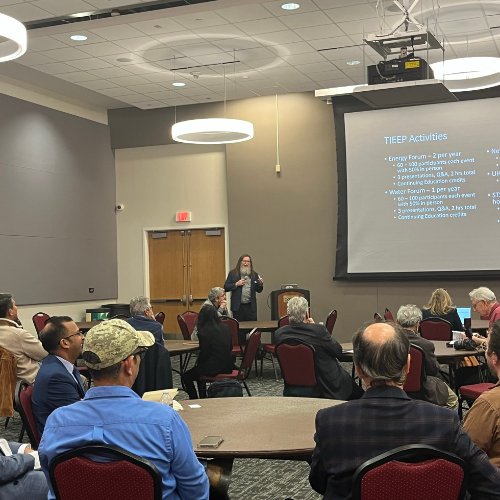
On March 6th, the Texas Industrial Energy Efficiency Program (TIEEP) hosted its annual Water Forum at the University of Houston, gathering industry leaders
to discuss sustainable water management. The event, organized by UH Energy’s Industrial
Engagement Program Director, Gary Gildert, focused on strategies to reduce water waste,
improve efficiency, and ensure long-term resource sustainability.
Featured speakers included Dr. Andrew Shaw from Black & Veatch, Tamim A. Popalzai
from FLUOR, and Rinesh Jivanji of Watercare Innovations, who shared their expertise
on innovative water treatment technologies, the economic benefits of sustainable practices,
and global approaches to water scarcity solutions.
Gary Gildert – The Importance of the TIEEP Water Forum
Gildert highlighted the importance of the event, explaining, "TIEEP events, like the Water Forum, serve two important purposes. The first is continuing education. We invite experts in the field to bring the latest in technology to a diverse group of operating engineers, managers, and consultants who can turn ideas into actions that improve the profitability and competitiveness of Texas industry." Gildert also emphasized the value of in-person events for fostering collaboration: "These in-person events provide a neutral territory for industry professionals to meet and exchange ideas for the collective improvement of Texas industries."
Tamim A. Popalzai – The Economic Case for Sustainability
The research of Tamim A. Popalzai of FLUOR focuses on recovering water from waste streams, offering both environmental and economic advantages. He stressed the significant impact sustainable water treatment can have on the energy sector. "One of the primary reasons TIEEP is important for the energy sector is that it focuses on improving energy intensity and reducing environmental impact, which enhances the sustainability of our Texas industries," Popalzai said.
Looking Ahead – The Future of TIEEP and Water Management
Looking to the future, Popalzai expressed hope for more engagement from end users:
"I’d like to see more engagement from end users so they can explore the various water
management options being presented that provide not only sustainable solutions but
potential economic benefits."
Key Takeaways and Future Outlook
The forum also covered industrial water recycling, energy-efficient treatment processes, and the integration of water conservation into corporate sustainability strategies. Panelists agreed that addressing water scarcity requires a mix of technological innovation, regulatory awareness, and cross-industry collaboration. TIEEP remains committed to fostering collaboration and innovation, aiming to expand its outreach and ensure industries have access to the latest advancements in water management and sustainability solutions.